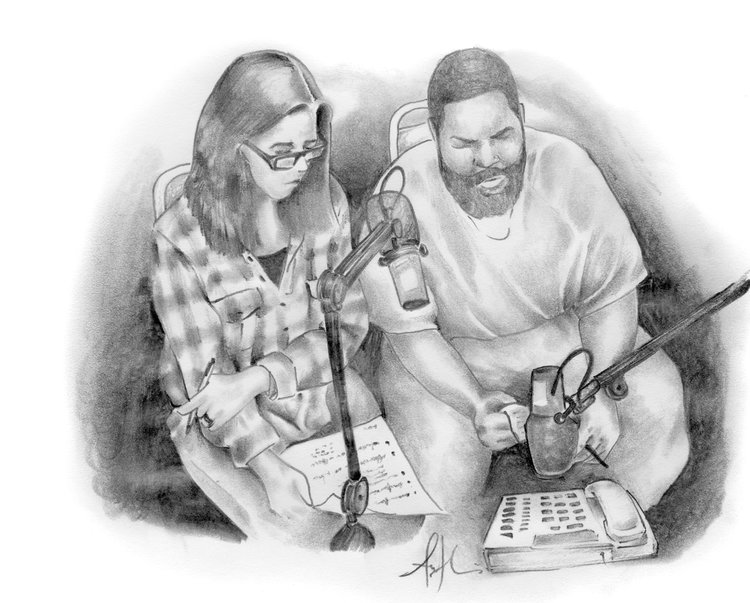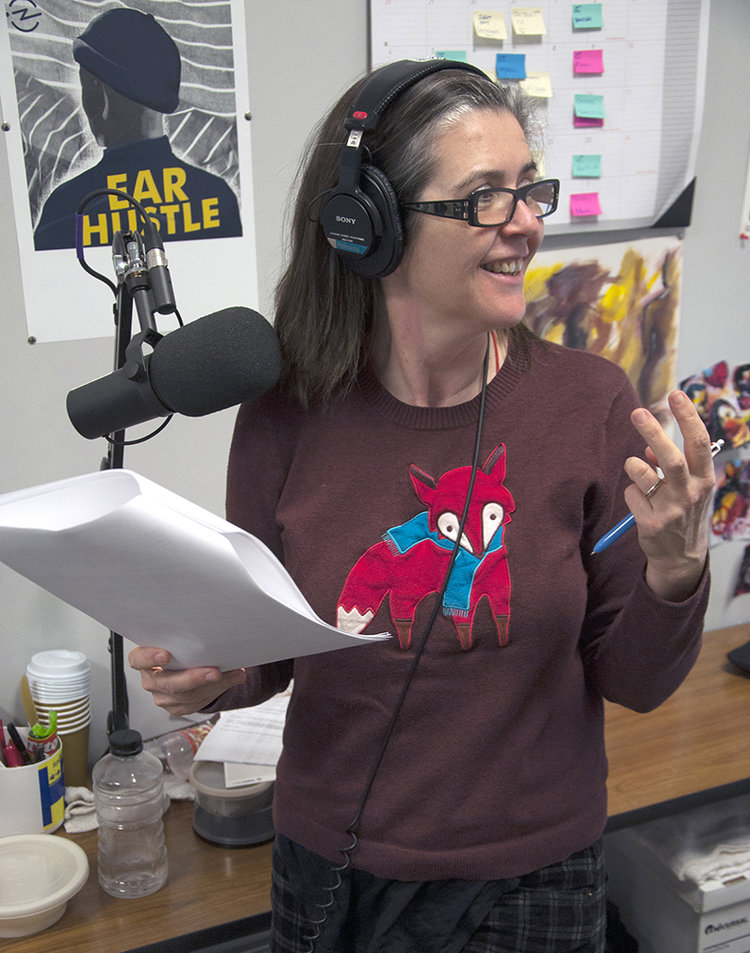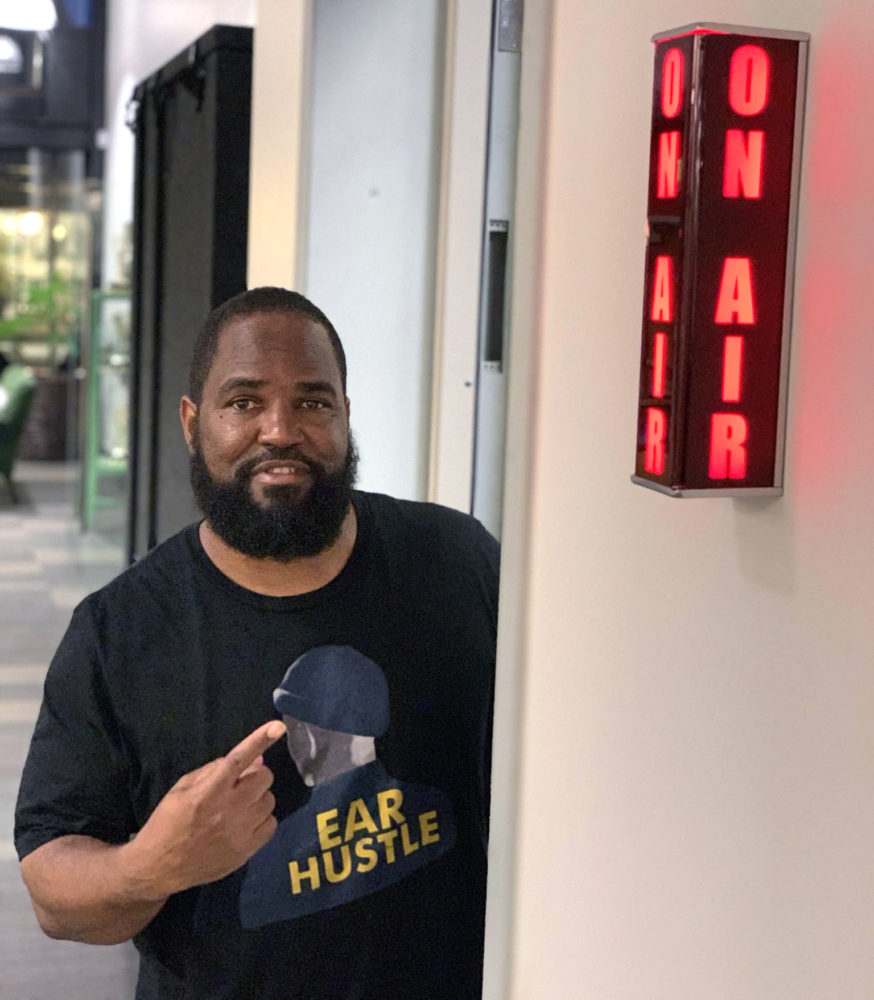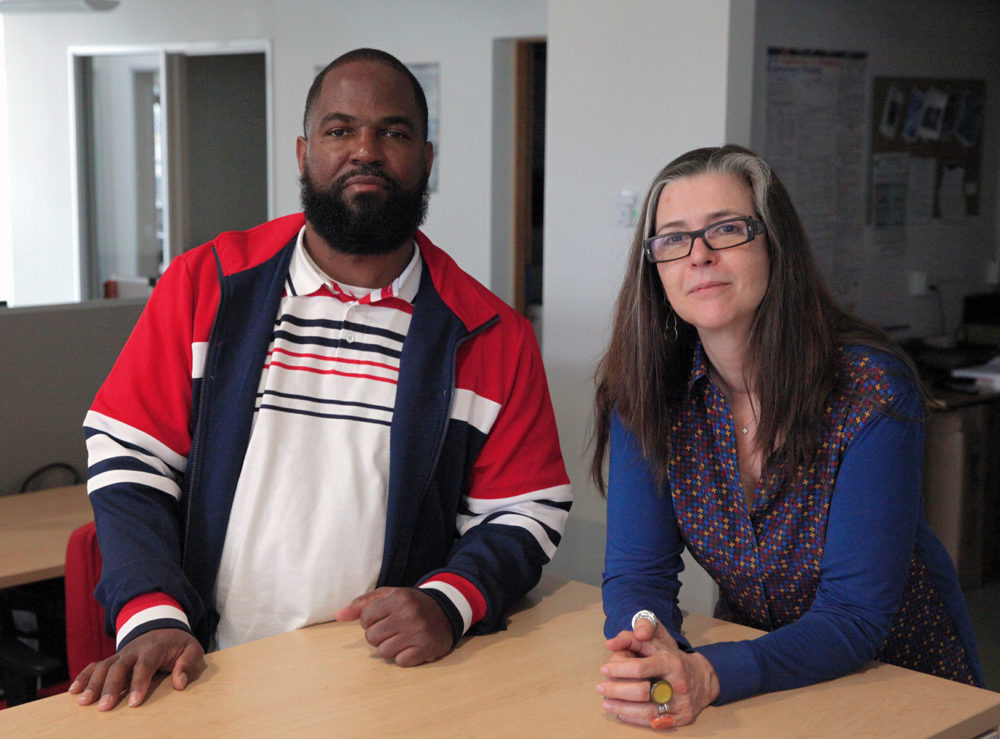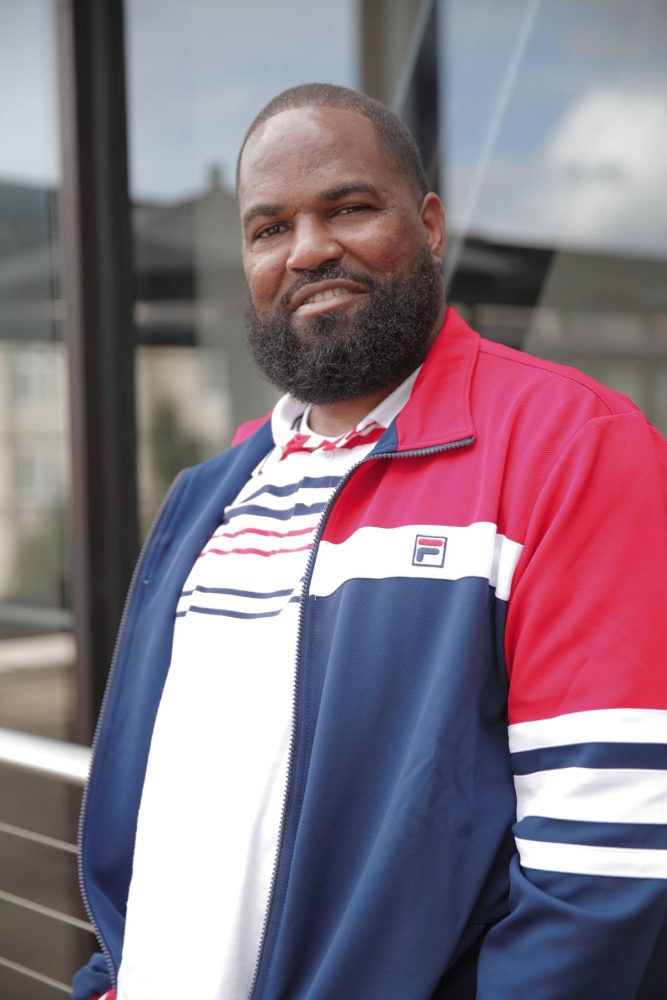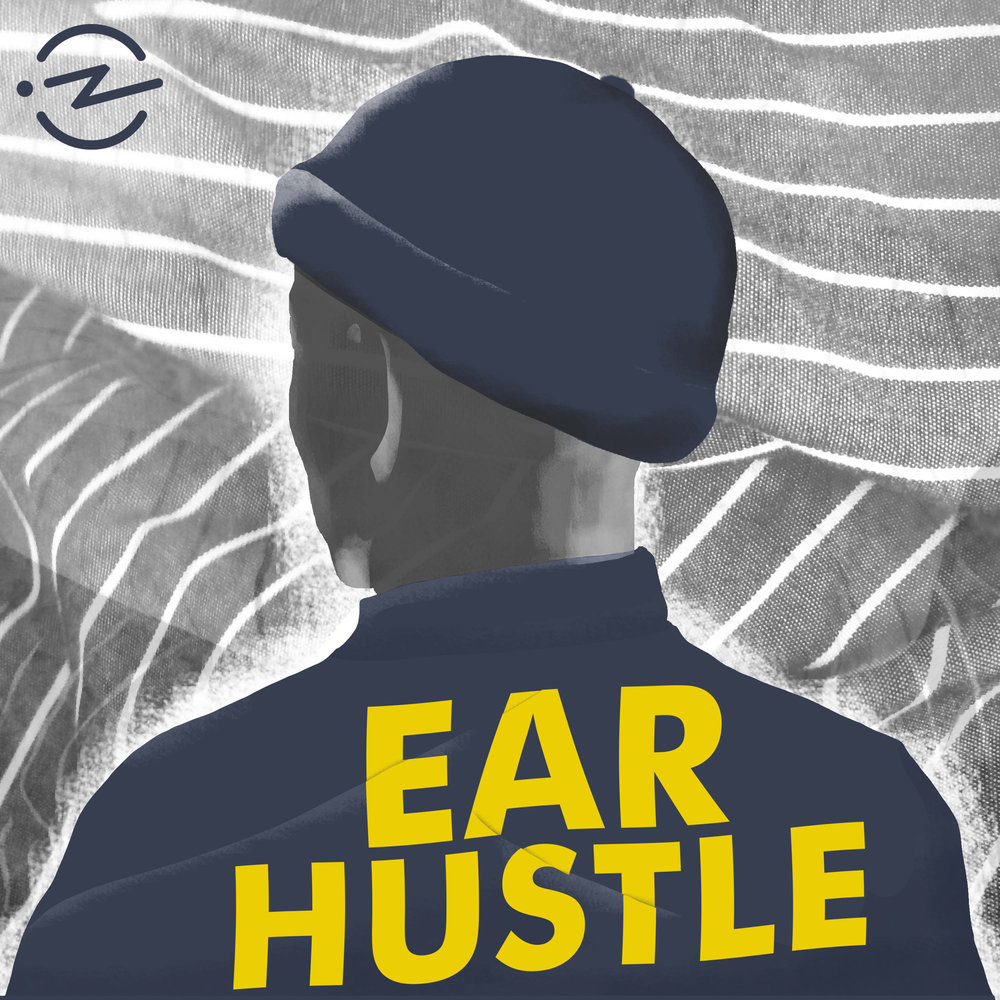In 2016, Radiotopia ran an open call-out for outstanding, story-driven podcast ideas using Submittable. A cutting-edge podcast network from PRX, Radiotopia created a Podquest to support innovation, diversity, and creativity in broadcasting. Three finalists were offered $10,000 to make three pilot episodes over four months and the winner became part of Radiotopia’s network. That winner was Ear Hustle.
Ear Hustle is a collaboration between Earlonne Woods and Nigel Poor, co-founded with Antwan Williams, focused on daily realities for those within the US prison system as well as life after incarceration. Woods and Williams are former inmates at San Quentin; Poor is a Bay area artist and prison volunteer. The show was first created and produced inside San Quentin.
There are endless, deeply inspirational stories that could be and have been told about Ear Hustle. One of the most powerful is the commutation of Woods’ 31-to-life sentence and his release from prison in part due to his work on the podcast. Ear Hustle was a finalist for the Pulitzer Prize in 2020 and has received countless, well-earned acknowledgements—both high level awards and worldwide support from individuals inside and outside the prison system.
This recent interview focuses on technology, since that story directly influences our work at Submittable every day. Talking to the hosts of Ear Hustle, joined by Radiotopia’s Executive Producer Julie Shapiro, was one of the highlights of my time working with Submittable as an editor. I hope you enjoy it—I also hope you support the show and incarcerated populations wherever in the world you reside.
This brief audio clip below is taken from the middle of the interview:
How did Radiotopia’s Podquest come about and what role did technology play?
Julie Shapiro: The podcasting industry is bonkers right now, with over a million podcasts, but 2016 was around the time we were starting to hear from so many more people with ideas—we were getting pitched every day for Radiotopia shows. So we thought, let’s invite people to send us their ideas with this high stakes prize of the winning entry becoming part of the network.
We built the call out and the technology was very easy to use. We appreciated it. It was simple for people who weren’t super technologically experienced to find their way through and submit, both audio and written responses.
We ended up getting over 1,500 entries. I had a team helping me review and we had judges, so we were able to assign things to people and they could weigh in and leave comments. I just remember that process being very, very helpful in this complicated contest that we had set up.
Ear Hustle emerged in the 11th hour. It was the strength of the idea and the people behind it that rocketed it up to becoming the winning choice.
Since then, I have remained pretty involved in supporting the show and Radiotopia uses technology every day to connect. We have a very strong community across all the shows and that’s largely because we’re in touch all day on Slack and email. That has also been the case for Radiotopia since the beginning.
Nigel Poor: One thing I think is really interesting is the divergent ways technology works inside prison and outside prison. It’s a completely different world. Technology in prison is extraordinarily limited, right? There’s no email, there’s no Slack, there are no cell phones. So it’s like we’re working in a different decade when we’re in the prison versus when we’re outside of the prison. So figuring out how to bridge that divide has always been a challenge.
Nigel and Earlonne, how did your partnership happen? Did technology influence it?
Nigel: I started volunteering in the prison in 2011 through the Prison University Project. I was teaching a history of photography class and that’s how I got into the prison and started meeting other men inside.
I got interested in doing other projects and I found out about the media lab at San Quentin. I started volunteering and working with the guys to produce a radio [show]. I certainly didn’t know anything about radio and that’s how I met Earlonne. He was in there working behind the scenes with technology.
It’s interesting—even though I said technology is really limited in San Quentin, from the first time I met Earlonne, he was the technology guy, the guy that could understand the technology that was in there.
So we worked together on a radio project for about three years and it was kind of falling apart. It wasn’t so interesting anymore and there were issues inside. But I’d gotten to know Earlonne pretty well during that time. And I was getting frustrated and thinking about leaving and Earlonne was supportive about my not leaving.
We started talking about doing a podcast, not even knowing exactly what that would mean. In our minds, a podcast meant that we could do long form storytelling, we could use music, we could be more creative, we could think like artists.
Our big goal was to have this podcast played inside San Quentin on the closed circuit station. And then we would start playing inside of other prisons. So we had, in some ways, not a huge goal, but a difficult one to do inside a prison system. And then we heard about the Radiotopia Podquest and that changed everything.
Earlonne Woods: When it comes to technology, that’s what actually got me interested in San Quentin in the first place. I was in a different prison and we were watching the Discovery channel and I saw that they had a film school at San Quentin, so I wanted to go there.
Nigel: Another thing that is interesting to me is, you know, I’ve lived outside prison all my life. I have access to as much technology as I want. When I started working on this podcast, I had a flip phone. I kind of hate computers.
Whenever there was a problem inside with a computer or recording equipment, Earlonne was always the problem solver. He would get the manual out, he would figure how to do it, and he'd actually teach me how to make stuff work. And so that really cemented our relationship that we could figure out how to support each other.
Also, I’m a little bit crabby and I get frustrated when I have to learn new technology and Earlonne knows exactly how to un-crab me. I don’t know if that’s a word, but he can see it coming and he’s like, okay.
Earlonne: San Quentin was one of a few different prisons with iMac-type computers and software. First, we started out with videos, making videos around the prison about whatever was going on. I started meeting a lot of guys and it wasn’t real hard to bring them down to the studio to do stories.
When you look at prisons, you try to get into a trade that interests you. And you know, the only thing they had was pretty much auto mechanics, auto body, print shop, stuff like that. So when I saw the film school and I was like, “They’re thinking outside the box, I’ve got to get there.”
That’s what got me to the media lab. It wasn’t hard getting people to come down and talk to us because they didn’t know where we were going. You know
Once a person feels comfortable when they sit down and start talking, they talk. And I don't think we ever had an issue with getting a person to open up.
Nigel: It’s certainly about technology. Once we started working with Radiotopia and PRX and the podcast started airing outside of the prison, it allowed people who had family members inside to hear stories that they could never hear before and be in touch with their family in a different kind of way.
Guys inside would talk to their family who would say, “We heard Ear Hustle, we heard so-and-so on. Can you be on the show?” So that technology getting outside the prison and being freely available to anyone on the outside encouraged more people on the inside to participate.
I think that’s a really beautiful example of how podcasting being free is so democratic. Almost anybody can hear it. And it has been such a beautiful way to share the kinds of stories that we do.
Julie: Technology enabled the transcripts that we offer on the website. We just got an email yesterday from someone thanking us for the transcripts that she’s sending to her brother inside. It’s both paper and technology, but really it’s because we could put them up easily to be downloaded. They get sent to Thailand. I mean, they get sent everywhere.
Nigel: The transcripts have been a lifesaver for people in prison who can’t hear the podcast. And we’ve heard quite a few stories from family members that they send the transcripts around to be read.
How did you get other prisons to start playing Ear Hustle?
Nigel: There’s the expression “prison Twitter,” which is just word of mouth and word of mouth is pretty powerful inside prison. So I think it got spread that way. The other thing, because we were fortunate enough to get picked up by Radiotopia, the podcast became popular pretty quickly.
Once it became popular on the outside, it made it pretty difficult for the California Department of Corrections to ignore what was happening.
And I think that also really encouraged them to play the podcast inside of all the other prisons in the California Department of Corrections and Rehabilitation. I think it’s about 34 prisons that it’s played inside.
Then the Prison Radio Association heard about what we were doing and they asked if they could play Ear Hustle inside all the prisons in the United Kingdom. So very quickly, because of technology, it was airing in 114 prisons in the UK and we didn’t even work for that. That just happened because people heard it.
How has the show evolved since that first episode? How did the support that you received help you take it to the level that you did?
Nigel: When we won the Podquest, we got some money and that enabled us to buy new equipment to bring inside the prison. So with that startup money, we got new computers, we got new recording equipment, we got Pro Tools, and we were able to make our inside studio pretty great. I mean, I don’t think just great for prison but we had really nice equipment because of the support from Radiotopia and that also meant we had to go from GarageBand to Pro Tools and learn Pro Tools. And again, that’s where Earlonne stepped in because he had the patience to learn it all.
Earlonne: It was probably different outside than inside because as the podcast got popular outside, on the inside, as far as us, we were still prisoners. We really didn’t see it like that. You know what I’m saying?
Nigel would definitely bring in comments and you know, how many downloads there had been and to us in there, there was nothing to weigh that up against.
Julie: You didn’t have a lot of context.
Earlonne: The only thing we deal with is basically closed circuit television. You know, we don’t deal with internet. When computers come in, whatever form they come in, that’s how they stay for the duration, you know, you don’t hook them up and update them. None of that.
Nigel: I wonder, Earlonne, if it started to make a difference that all of a sudden people started coming in to interview us, like Ted Koppel and The Today Show and all these journalists. That had to signal that something big was happening?
Earlonne: I mean we definitely could see it, but we couldn’t really, really see it. But there was one real test—this showed everything.
On tours that came through the prison, they used to just pass us up, pass us up. Then they wanted to come directly to us and pass everything up. And that never stopped—that became the new staple. Like we was nothing on that tour. But then we became the tour. Everybody wanted to come see Ear Hustle.
That’s when it was like, ok, they kind of like this out there.
Julie: I’ll say, from the Radiotopia perspective, everyone in the network was so excited about the show that we had no trouble getting everyone on board to help launch it. In fact, almost every show in the network created an episode around the theme of doing time, which was a way that we could welcome the show into the network. Not by telling prison stories—they interpreted that theme loosely. And we were able to curate a collection of stories in honor of the show starting.
That just speaks to how much appreciation everyone throughout Radiotopia and PRX had for what the show was, and the ambition of the show. And, then objectively, it really helped because a lot of people were mentioning it to a lot of their listeners. And so this momentum started to build and the press came to us. We’ve done very little outward pushing of the show—we haven’t had time because we’re so busy fielding the inbound requests and keeping the show going.
From a network point of view, it was pretty special and unique to see the success from the jump, so quickly, and then it’s just held on to that. It is one of the biggest shows in the network and it gets so much public praise that it’s literally a full time job to just stay on top of that and be responsive through technology.
Nigel: As the show has grown, the team has grown and it’s gotten more way more complicated to put it together. But it definitely started with a very humble idea and humble, humble technology, humble computers.
When we were doing the contest, as finalists we had to have a phone call with Julie and some other people and guys inside can't touch phones. And so we had to arrange, you know, East Coast, West Coast to have this cell phone call and it was very tense.
We had to meet Lieutenant Robinson up in the chapel for the phone call and as we were going up there, an alarm went off inside the prison, which means everyone has to sit down and you can’t move.
I was sweating about if we were going to get to the call or not, but miraculously the alarm lifted. Lieutenant Robinson showed up and he opened up his cell phone. We were all sitting in folding metal chairs and he put his cell phone down on a folding metal chair and we all had to just lean in and talk because none of us could actually touch the phone.
And then we had a great almost hour-long conversation about Ear Hustle. But in a very kind of humble surroundings with very minimal technology.
Earlonne: Not knowing about technology, I realize now that we really didn’t have to lean in, we could have just sat back.
Did you anticipate the success Ear Hustle has had?
Nigel: We have different stories about this. Earlonne, tell her your prediction.
Earlonne: So, being incarcerated and knowing how many people were incarcerated at the time in the United States, I knew some people would listen to it. I knew it would resonate with some people. You’ve got two point-something million people in prison with at least three family members—somebody was gonna listen to us.
I think we asked Julie, what’s successful? I can’t recall if it was 20,000 for the season or for an episode, or 50,000 for the season or an episode was successful. I was like, I think we’re going to hit a million. And they were like, you know, a million is real high. I think in our first month we hit a million.
Julie: We had no idea. Not if it would be successful, because we knew we had this very special project but we definitely underestimated at the beginning.
Nigel: I will say that I knew it was good. I knew we had quality stuff to share. I had no idea how successful it would be. I assumed because I was interested, other people would be, but I continue to be humbled. I said this early on: the reality of it is bigger than the dream we had. I still feel that way.
It's changed everyone's life who's been involved with it. And I think it's changed the lives of so many people who participated and so many people who listen. I mean, it's changed my life and Earlonne’s life. We have this whole career together, we have this whole partnership. That in itself is pretty astounding.
Julie: The team is so close and we all care so much about it. I’ve never worked on a creative team quite like this one.
Earlonne, what is it like making the show on the outside?
Earlonne: I always clown and say the difference is inside, you really didn’t have to chase people down to interview them. They were all within a one mile radius. Outside you gotta deal with jobs. Maybe the person might make it, they’ve got kids and everything—you just have to chase people down. But I think that’s pretty much the only difference, you know.
I tend to know a lot of formerly incarcerated people. So that’s what we’ve evolved to, which is tracking down formerly incarcerated individuals and interviewing them and having these cool dialogues. Not even just formerly incarcerated—we just did an episode where we talked with women that are involved with incarcerated individuals.
Right now with COVID, It is pretty much everything in the house and I think with COVID it’s been more work. Would you say that, Nigel? Has it been more work or because we’re in this different environment does it just feel like that?
Nigel: It feels like more work. It feels like more of a slog. Because we’re setting up our studios in our closets and doing things on the phone, the quality is different. I’m certainly, like everyone, longing for the days when we can go back to going inside the prison. And I don’t know when that’s going to be, you know?
And that’s where technology gets very difficult. I haven’t been in San Quentin in I don’t know how many days. It’s probably been 50 days now. And I have very little contact with the people inside.
Every once in a while there are phone calls. But I can't email anyone in there. I can't call anybody. I can't text anybody. So that's when the lack of technology feels pretty heavy.
Earlonne: Back to the basics.
Nigel: When Earlonne was inside, not having technology made us so organized. I couldn’t really be in touch with Earlonne, so whenever I left we always had a game plan about what would happen if I couldn’t come back in the next day. We were on point very seriously.
Now, I can text Earlonne any time I want and he can call me anytime he wants. So if we forget something, it’s very easy. But at that point if something fell between the cracks, it was really bad.
I remember one time, there was a three week lockdown. When that happens there’s nothing, it’s just a blank space.
What are the downsides and risks of relying on technology?
Earlonne: Not pushing the record button. That rarely ever happens, but on one show, there was probably the best mariachi performance ever and I didn’t hit the button. I’m like, why does it say zero, zero, zero?
Julie: Something that occurs to me is about the pressure with technology. Nowadays, we launch the episodes at three in the morning to catch people on the other side of the planet and offer something for commuters to have as they’re waking up and going into work.
You push a button and the podcast goes out to the bajillions of people waiting for it and then, you know, if you have one error or something’s misspelled in the show notes or anything… I think the stakes are so high now because of what the show has achieved so the dance you do with technology to get it to people is a little fraught with not making the wrong move any step of the way. It’s ultimately fixable too but you always want to get out with your best foot forward.
Earlonne: It’s basically been all upsides, huh?
Nigel: I mean, I have much more access to things than the guys inside that I work with. We always try our best to keep everyone inside as updated as possible but it will never be possible for us to be on an equal technological footing.
How has technology influenced your work on Ear Hustle during COVID-19?
Earlonne: I think technology has played the biggest role of all, in everything.
It's like technology makes it to where the doors don't shut, you know, the podcast still plays. Everything we do is through technology, every bit of it.
Nigel: We wouldn’t be doing anything without it. I mean the fact that Earlonne and I can still record narration and set up studios in our closets and work with our producer Bruce to like hook us together so we can all be on Zoom recording… he can record us, we record our own ends, and we can email or Dropbox the audio. Without it, we would be dark right now.
Earlonne: Definitely. And I think even when I’m just going down to Southern California to see family, I take my backpack and my backpack pretty much has the whole studio in it.
Julie: We put out a call for stories about families impacted by COVID to people with loved ones on the inside. We got a lot of response to that. And I’ve heard anecdotally from some of those people writing in that they can’t visit anymore, but they can still get the phone calls.
At least one prison was letting people talk on the phone a little bit more often because they couldn’t see people in person. So I know like the telephone and landlines don’t feel like technology that much anymore but they are and they are helping as a network when families can’t get in to visit people.
Nigel: I’d also like to bring up the oldest technology in the world. We put a call out and we still get a lot of mail from prisons and people specifically reacting to our requests about what’s happening inside around COVID. And so this old technology still does work sometimes.
Julie: And it’s so important to people on the inside and it’s maybe the one thing we’ve seen in terms of impacting listeners’ lives. We get unbelievable emails. People saying like, I changed my college trajectory after listening to Ear Hustle and now I’m going into criminal justice. So many people write and say, I’d love to send a letter to someone incarcerated. Thank you for helping me realize that this small gesture means so much to people. So, we do hope that’s been a significant change—that even more prisoners are receiving letters everywhere.
Nigel: I think Earlonne got tired of how much mail he got it.
Earlonne: You know, when you’re in prison, you want problems, you know what I’m saying? You don’t have no problems and then you get like 10 or 15 pieces of mail a week or 10 pieces of mail a day. It gets to the point where I could not respond to everybody. I would have to do it by hand—it’s not like you have a computer and then when do you have time for that? We were at work all day and then you get back—you don’t want to deal with that.
The problems of success were very great but I was rocking with them.
How can people support Ear Hustle and support incarcerated populations?
Earlonne: You can definitely support what we do. You know, the show is free to everybody.
Nigel: But it’s not free to make.
Earlonne: It’s not free to make at all. So please make any donation. We will take $7 a month down.
Julie: We love when people share the show and help grow the audience. We also have some really wonderful merch. We put out a call for listener-designed logos and I’m wearing the shirt with the winning logo. These are limited, but people can always buy the old ones. Our coffee mugs are also wonderful. And it all helps support the production of the show.
Earlonne: And support college degrees. A percentage goes to PUP, the Prison University Project.
Julie: One thing I’ve witnessed just from people are the droves of questions we get, asking how can I do something myself?
You know, there's just so much out there that you can do. I think it’s about starting locally and researching what you can do in your community, even donations of books. For those who are motivated, there really are ways to get involved. It takes a little homework and you gotta kind of put some effort into it, but you know, just get online and start looking at what their options are.
Nigel: I started volunteering in a prison. That’s how I got involved in it because I was just interested. I just did some research and found out about the fantastic Prison University Project. So if I found it, anybody can find it.
Earlonne: I think it found you now though. You got a few letters in the mail.
Nigel: Speaking of mail, that is one way I got interested in San Quentin—I got letters mis-delivered to my house from San Quentin. The address they were going to was not my address. It was so weird and I would deliver it to the right place and I was like, wait, this is strange. And that got me thinking, I’ve got to find out what’s going on inside prison.
So, yes, thanks to that old technology of letter writing that got me there.
Julie: We just gave you the whole narrative arc of the interview, Rachel.
Earlonne: Nigel, isn’t there something we want to say? Don’t we want to thank Submittable for giving Radiotopia the technology to do the Podquest?
Julie: I do, definitely.
Nigel: Absolutely, man.
Earlonne: We definitely thank Submittable.
Julie: We say that it took a village, it still takes a village for sure. And Submittable is a resident of the village.
This interview with Ear Hustle and Radiotopia has been edited for length and clarity. All images courtesy of Radiotopia and Ear Hustle.
